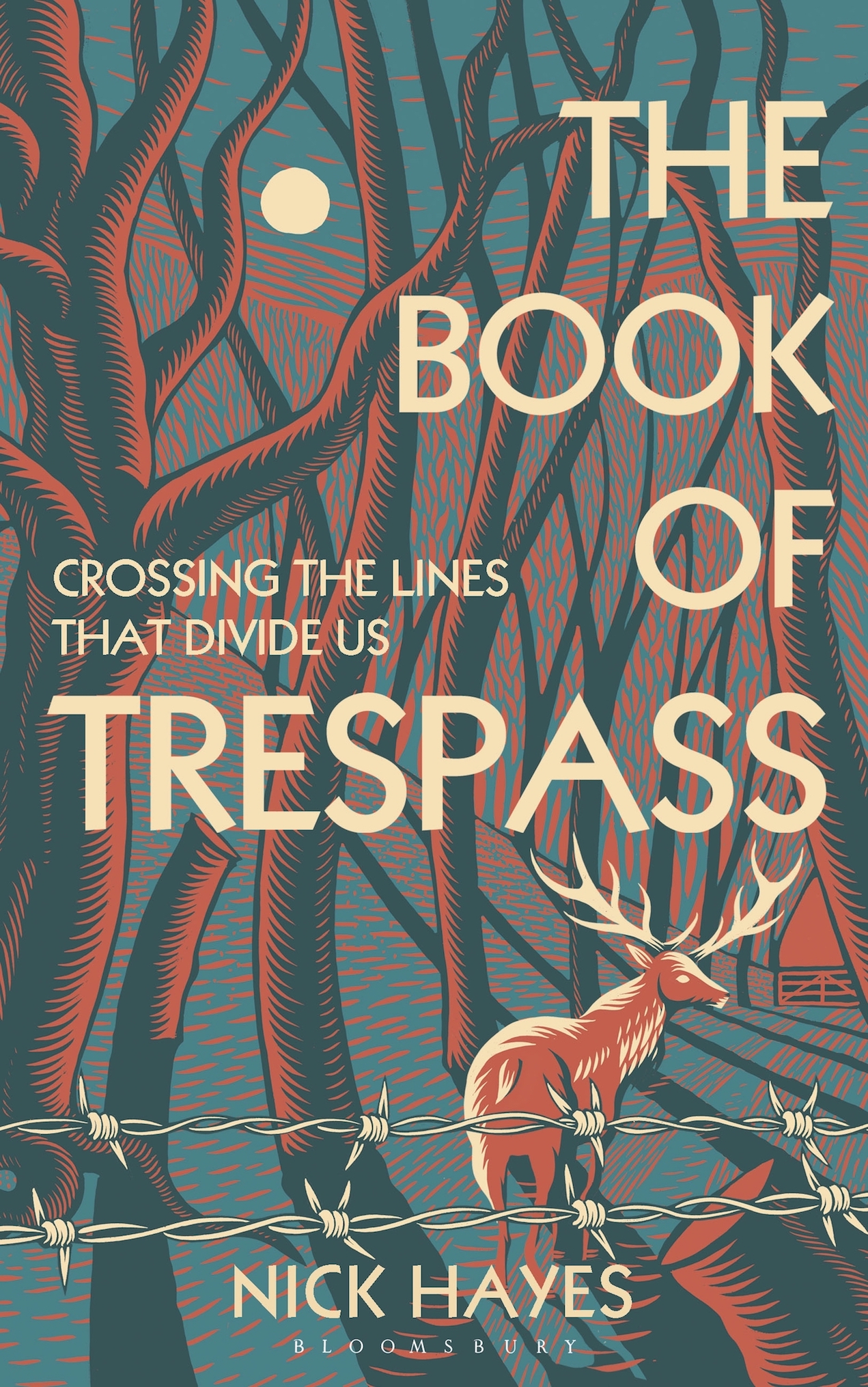Nick Hayes: The Book of Trespass review – a leap over England's walls | reviews, news & interviews
Nick Hayes: The Book of Trespass review – a leap over England's walls
Nick Hayes: The Book of Trespass review – a leap over England's walls
Nature, culture and history converge in this exhilarating tale of intrusion and exclusion

Since snobbery and deference have a big part to play in Nick Hayes’s exhilarating book, let’s start with the obligatory name-drop. I have lunched – twice, in different country piles, and most enjoyably – with one of the principal villains of The Book of Trespass. Richard Scott, tenth Duke of Buccleuch, owns around a quarter-million acres of Britain (no individual has more, although the Crown Estate, the National Trust, the Forestry Common, the RSPB and MoD outgun the Buccleuchs).
His Grace – genial, generous, green-minded – will enjoy Hayes’s account of slipping into the 11,000-acre estate around Boughton House in Northants (the “English Versailles”, and one of the Buccleuch seats) only to be scolded for his intrusion by both male (menacing) and female (polite) guardians in “a caricature of gendered debate”. Later, Hayes makes clear that his mission to free the land of England from the fences that bound it, and the “mindwall” that habituates its people to an unjust status quo, demands more than a few titled heads on pikes. It makes no sense, he argues, to create “fairy-tale ogres as if their own personalities are to blame” for centuries of law, force and propaganda. “An absolutist, partisan mindset” gets us nowhere: it turns out that even the model for Toad Hall in Wind in the Willows belongs to an exemplary enlightened landowner, Sir Julian Rose, whose organic estate embodies “almost every ideal of the land movement”. All the same, I would pay well to see Nick Hayes and the 10th Duke on a platform together.
Fences, wall and divisions of all kinds run through Hayes’s book – a gorgeously written, deeply researched and merrily provocative tour of English landscape, history and culture through the eyes of the trespassers who have always scaled, dodged or broken the barriers that scar our land. Even with recent, grudging adjustments to the law, people in England have the “right to roam” over only 10 per cent or so of their native country, and to boat down a mere 3 per cent of its waters. In global terms, that’s an almost-unique dearth of entitlement. The length of public footpaths has actually halved, to around 118,000 miles, since the 19th century. Hereditary aristocrats still own “a third of Britain”, even though foreign corporations now run them close (and have colonised the iconic Wind in the Willows villages by the Thames). Hayes wants to understand not just how this theft of access happened, how the old shared culture of the “commons” gave way to absolute rights of ownership, but “why we allow ourselves to be fenced off in this way”.
 A graphic novelist and illustrator (his own atmospheric, Edward Bawden-esque scenes punctuate his chapters), he crosses the boundaries of one grand domain after another – from Boughton (pictured above) to Cliveden, Arundel Castle to Highclere Castle (aka Downton Abbey, pictured below), Basildon Park to Windsor Castle itself, where the tour ends as he wonders whether to breach the royal bounds and so risk the draconian criminal sanctions that now protect the Queen’s personal acres from snoopers. Splendidly eloquent nature-writing evokes the woodlands, the wildlife, the landscapes and ecologies of the countryside that the post-Norman millennium of property law – or, if you prefer, “violence and theft” – has shaped, for good or ill. Symbolic animals – badger, fox, hare, stag, pheasant and so on – head the chapters and populate the stories within them. Along the way, as he mounts walls and encounters gamekeepers or gardeners, Hayes digs deep into the history of landed property in England from the Norman Conquest to the National Parks Act, by way of enclosure and dispossession at home, slavery and colonialism abroad, rural rebellion and popular pushback, from anti-enclosure riots to gypsies, vagrants and “witches” with their “decoctions of sedition and heresy”. In a pivotal, and timely, chapter, Hayes links subjection overseas to servitude at home: “Slavery was an extreme version of a time-honoured hierarchy in England: its impetus was profit, its disguise was race, but its mechanism was class”. Poor England was the first British colony.
A graphic novelist and illustrator (his own atmospheric, Edward Bawden-esque scenes punctuate his chapters), he crosses the boundaries of one grand domain after another – from Boughton (pictured above) to Cliveden, Arundel Castle to Highclere Castle (aka Downton Abbey, pictured below), Basildon Park to Windsor Castle itself, where the tour ends as he wonders whether to breach the royal bounds and so risk the draconian criminal sanctions that now protect the Queen’s personal acres from snoopers. Splendidly eloquent nature-writing evokes the woodlands, the wildlife, the landscapes and ecologies of the countryside that the post-Norman millennium of property law – or, if you prefer, “violence and theft” – has shaped, for good or ill. Symbolic animals – badger, fox, hare, stag, pheasant and so on – head the chapters and populate the stories within them. Along the way, as he mounts walls and encounters gamekeepers or gardeners, Hayes digs deep into the history of landed property in England from the Norman Conquest to the National Parks Act, by way of enclosure and dispossession at home, slavery and colonialism abroad, rural rebellion and popular pushback, from anti-enclosure riots to gypsies, vagrants and “witches” with their “decoctions of sedition and heresy”. In a pivotal, and timely, chapter, Hayes links subjection overseas to servitude at home: “Slavery was an extreme version of a time-honoured hierarchy in England: its impetus was profit, its disguise was race, but its mechanism was class”. Poor England was the first British colony.
Crucially, and ambitiously, he argues that “Englishness has always been defined by the landed lords of England and fed in columns of hot air to the landless”: our old friend, nationalism as false consciousness. Globally, an imperial machinery of slavery and conquest both bankrolled and legitimised the “cult of exclusion” that kept the English off their own turf. At home, the “magical architecture” and seductive contours of the great estates lent that dogma a patina of beauty and grace. Meanwhile, poachers swung from gibbets, plantation slaves toiled and died, proud commoners became a cowed rural proletariat and, in post-industrial mass society, the heritage industry served up centuries of mass uprooting and intimidation as a glorious aristocratic legacy. Land became a “commodity alone”, “partitioned from the web of social ties” that truly gives it value.
Hayes, as he would readily admit, stands on the shoulders of green (and sometimes red) English giants. His visionary, lyrical critique and elegy echoes with the voices of rural radicalism, from Williams Cobbett, Hazlitt and Morris, forward through George Orwell, EP Thompson and Richard Mabey, back to popular hatred of the “Norman Yoke” and tyrant grandees on horseback, and even to the rooted equality dreamed by Levellers, Diggers and the sectaries of the Civil War. I would have liked more poetry (although Hayes’s prose can thrillingly take flight on its own) – the incomparable John Clare seems to haunt every page without ever surfacing by name from the underbrush.
 “If England is full,” Hayes laments, after showing how migration panics again misdirect people as to the true sources of their vulnerability, “it is full of space. And the walls that hide it.” When it comes to ways to overcome not just the laws that keep us off the terrain we formerly shared, but the “optical illusion of walls and words” in English minds, The Book of Trespass has mightier fences to climb. Hayes frequently argues in a totalising, maximalist vein, with property rights as key to the “entire dynamic of elite power” that fuels racism, patriarchy and inequality of all sorts. Even poor old anglers, those “fisher-kings” with their bought licences, get it with both barrels as lackeys of the ruling class, opposed to the free-spirited kayakers who paddle over partitions with proper revolutionary zeal.
“If England is full,” Hayes laments, after showing how migration panics again misdirect people as to the true sources of their vulnerability, “it is full of space. And the walls that hide it.” When it comes to ways to overcome not just the laws that keep us off the terrain we formerly shared, but the “optical illusion of walls and words” in English minds, The Book of Trespass has mightier fences to climb. Hayes frequently argues in a totalising, maximalist vein, with property rights as key to the “entire dynamic of elite power” that fuels racism, patriarchy and inequality of all sorts. Even poor old anglers, those “fisher-kings” with their bought licences, get it with both barrels as lackeys of the ruling class, opposed to the free-spirited kayakers who paddle over partitions with proper revolutionary zeal.
His book’s impish woodland tales of spliffs smoked, magic mushrooms sampled and MDMA dabbed place Hayes firmly in one specific camp – in class and cultural terms – among modern rural dissidents. Yet he sometimes tries to reach out to a wider, more inclusive, constituency. He outlines the merits of a Land Value Tax (first proposed by Lloyd George and Winston Churchill in the 1909 “People’s Budget”), praises the mainstream Sheffield campaign to halt the vandalistic destruction of the city’s trees, and saves kind words for the – thoroughly bourgeois and middle-of-the-road – Scottish government’s freedom-to-roam laws. But then English trespassers, legal and literary, have long regretted the cap-doffing, forelock-tugging (or, today, Brexit-backing and Mail-reading) docility of their fellow-countrymen, while seeking to stir up their dormant rebel spirits.
 Hayes spots the danger of a “binary perspective”, them against us. He takes care never to demonise the keepers and estate workers he confronts on his wall-breaching escapades. In the end, though, for all its exuberance and erudition, The Book of Trespass is unlikely to cross many of the fraudulent culture-war fences that divide citizens today. But for anyone already within Hayes’s palisades, or tempted to traverse their usual limits, it will quicken the mind and lift the spirits. Not destiny but documents, not nature but coercion, have walled us from our land. This inspirational book offers a sharp-eyed, muddy-booted guide to the long, sorry process that left the English “simultaneously hedged out of their land and hemmed into a new ideology”. Take it along next time you plan to jump any fence.
Hayes spots the danger of a “binary perspective”, them against us. He takes care never to demonise the keepers and estate workers he confronts on his wall-breaching escapades. In the end, though, for all its exuberance and erudition, The Book of Trespass is unlikely to cross many of the fraudulent culture-war fences that divide citizens today. But for anyone already within Hayes’s palisades, or tempted to traverse their usual limits, it will quicken the mind and lift the spirits. Not destiny but documents, not nature but coercion, have walled us from our land. This inspirational book offers a sharp-eyed, muddy-booted guide to the long, sorry process that left the English “simultaneously hedged out of their land and hemmed into a new ideology”. Take it along next time you plan to jump any fence.
- The Book of Trespass: Crossing the lines that divide us by Nick Hayes (Bloomsbury Circus, £20)
Add comment
The future of Arts Journalism
You can stop theartsdesk.com closing!
We urgently need financing to survive. Our fundraising drive has thus far raised £49,000 but we need to reach £100,000 or we will be forced to close. Please contribute here: https://gofund.me/c3f6033d
And if you can forward this information to anyone who might assist, we’d be grateful.

Subscribe to theartsdesk.com
Thank you for continuing to read our work on theartsdesk.com. For unlimited access to every article in its entirety, including our archive of more than 15,000 pieces, we're asking for £5 per month or £40 per year. We feel it's a very good deal, and hope you do too.
To take a subscription now simply click here.
And if you're looking for that extra gift for a friend or family member, why not treat them to a theartsdesk.com gift subscription?
more Books
 'We are bowled over!' Thank you for your messages of love and support
Much-appreciated words of commendation from readers and the cultural community
'We are bowled over!' Thank you for your messages of love and support
Much-appreciated words of commendation from readers and the cultural community
 Elizabeth Alker: Everything We Do is Music review - Prokofiev goes pop
A compelling journey into a surprising musical kinship
Elizabeth Alker: Everything We Do is Music review - Prokofiev goes pop
A compelling journey into a surprising musical kinship
 Natalia Ginzburg: The City and the House review - a dying art
Dick Davis renders this analogue love-letter in polyphonic English
Natalia Ginzburg: The City and the House review - a dying art
Dick Davis renders this analogue love-letter in polyphonic English
 Tom Raworth: Cancer review - truthfulness
A 'lost' book reconfirms Raworth’s legacy as one of the great lyric poets
Tom Raworth: Cancer review - truthfulness
A 'lost' book reconfirms Raworth’s legacy as one of the great lyric poets
 Ian Leslie: John and Paul - A Love Story in Songs review - help!
Ian Leslie loses himself in amateur psychology, and fatally misreads The Beatles
Ian Leslie: John and Paul - A Love Story in Songs review - help!
Ian Leslie loses himself in amateur psychology, and fatally misreads The Beatles
 Samuel Arbesman: The Magic of Code review - the spark ages
A wide-eyed take on our digital world can’t quite dispel the dangers
Samuel Arbesman: The Magic of Code review - the spark ages
A wide-eyed take on our digital world can’t quite dispel the dangers
 Zsuzsanna Gahse: Mountainish review - seeking refuge
Notes on danger and dialogue in the shadow of the Swiss Alps
Zsuzsanna Gahse: Mountainish review - seeking refuge
Notes on danger and dialogue in the shadow of the Swiss Alps
 Patrick McGilligan: Woody Allen - A Travesty of a Mockery of a Sham review - New York stories
Fair-minded Woody Allen biography covers all bases
Patrick McGilligan: Woody Allen - A Travesty of a Mockery of a Sham review - New York stories
Fair-minded Woody Allen biography covers all bases
 Howard Amos: Russia Starts Here review - East meets West, via the Pskov region
A journalist looks beyond borders in this searching account of the Russian mind
Howard Amos: Russia Starts Here review - East meets West, via the Pskov region
A journalist looks beyond borders in this searching account of the Russian mind
 Henry Gee: The Decline and Fall of the Human Empire - Why Our Species is on the Edge of Extinction review - survival instincts
A science writer looks to the stars for a way to dodge our impending doom
Henry Gee: The Decline and Fall of the Human Empire - Why Our Species is on the Edge of Extinction review - survival instincts
A science writer looks to the stars for a way to dodge our impending doom
 Jonathan Buckley: One Boat review - a shore thing
Buckley’s 13th novel is a powerful reflection on intimacy and grief
Jonathan Buckley: One Boat review - a shore thing
Buckley’s 13th novel is a powerful reflection on intimacy and grief
 Help to give theartsdesk a future!
Support our GoFundMe appeal
Help to give theartsdesk a future!
Support our GoFundMe appeal

Comments
The book is, in some respects